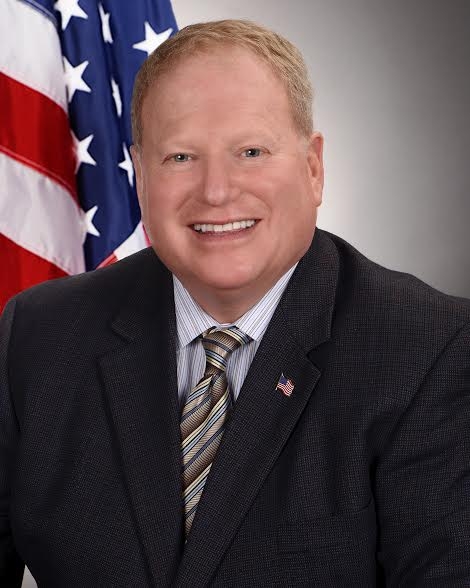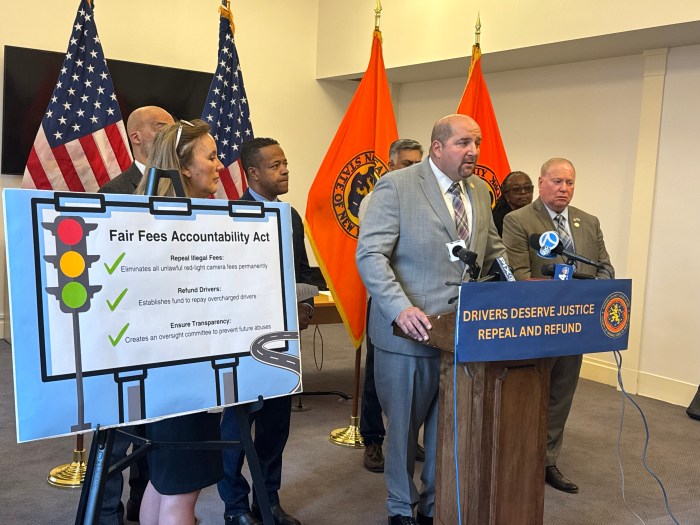Edward Mangano Ordered To Pay Over $10 Million
Former Nassau Exec also facing prison pending appeal

Former Nassau County Executive Edward Mangano has been ordered to pay more than $10.6 million to two Connecticut insurance companies for defaulted loans that Mangano facilitated during his time in office.
In 2019, Mangano was convincted on federal corruption charges for accepting bribes and using his position to influence the Town of Oyser Bay to guarantee loans and local contracts for restaurateur Harendra Singh. During trial, Singh and former Town of Oyster Bay attorney Leonard Genova testified against Mangano, among others. In April 2022, Mangano and his wife, Linda Mangano, were sentenced to 12 and 15 years imprisonment, respectively, for their roles in the early-to-mid-2010s scheme.
As Nicole Fuller reported for Newsday in mid-July, U.S. District Judge Joan M. Azrack has now ordered Mangano to pay back $25 in restitution every three months while he is in prison, and 10 percent of his gross monthly income after he’s released. In total, Judge Azrack found Mangano to be liable for the sum of $10,630,016.80.
Mangano is currently appealing his prison sentence, which is scheduled to begin on July 27 as of press time.
The Manganos of Bethpage were convicted in the Eastern District of New York on March 8, 2019 after a jury trial. The pandemic, as well as an endless series of defense motions and other court proceedings, delayed their sentencing for 37 months.
The impending incarceration closes the door on a once-promising political career for Mangano, who closely upset two-term County Executive Thomas Suozzi in 2009 to step up from the county legislature. The Hofstra University alum served from Jan. 1, 2010 to Dec. 31, 2017, handily defeating Suozzi in a rematch in 2013. Under indictment during the 2017 election season, and reportedly out of favor with the Nassau County Republican establishment, Mangano chose not to seek a third term. There was speculation that he could mount an independent bid for reelection, or run under his own creation, the Tax Revolt Party. It twice provided him a second line on the ballot.
The pol was convicted of multiple counts of accepting bribes and kickbacks in exchange for official government action, and for conspiracy to obstruct justice. He was also ordered to pay a $20,000 fine. His wife was convicted of conspiracy to obstruct justice, obstruction of justice and making false statements to FBI agents in connection with her employment by 63-year-old Long Island restaurateur Harendra Singh.
Singh was at the center of the original federal indictments, unsealed on Oct. 20, 2016, also naming former Town of Oyster Bay Supervisor John Venditto.
The government’s case centered on the relationship between the three accused and Singh, of Laurel Hollow. Singh, who held concessions at the Town of Oyster Bay Golf Course and two town beaches, was accused of bribing the then-elected officials in exchange for loan guarantees in Oyster Bay, as well as contracts with the county government. He pleaded guilty to bribery charges and became a prosecution witness,
The original indictment charged Ed Mangano and Venditto with conspiracy to commit federal program bribery and honest services fraud. Linda Mangano reportedly was given a “no-show” job by Singh at his Water’s Edge restaurant in Long Island City at her husband’s behest. Between April 2010 and August 2014, the government claimed, she earned $450,000.
In addition, the government charged the accused and their families of receiving free meals at Singh’s numerous eateries, free limousine rides, vacations paid by Singh and even, in the case of Mangano’s son, a watch that cost Singh more than $7,000.
According to a press release, “Edward and Linda Mangano conspired to obstruct a federal grand jury investigation when they schemed with Singh to fabricate examples of work never performed by Linda Mangano at the Water’s Edge, in an attempt to thwart a grand jury investigation. On May 20, 2015 and May 22, 2015, Linda Mangano made false statements to the FBI and federal prosecutors about the work she claimed to have performed for Singh.”
The government claimed that shortly after Mangano assumed office in 2010, he pressured Venditto to “…help Singh obtain financing in order to make required capital improvements at [Tobay] Beach and The Woodlands at the [Town of Oyster Bay Golf Course], by authorizing the [town] to indirectly guarantee four bank loans totaling approximately $20 million. Mangano used his official position to ensure that [Oyster Bay] backed the loans.” Singh, according to court documents, was struggling financially and having trouble making the capital improvements mandated by the terms of his concessions.
According to a transcript of the trial obtained by Anton Media Group, Singh said on the witness stand, “I bribed Ed Mangano and he did favors for me.”
All three originally pleaded not guilty. On May 31, 2018, Judge Azrack declared a mistrial in the government case against the Bethpage couple after the jury foreman stated that he could no longer carry out his duties and asked to be excused. Reportedly, the jury was deadlocked over the charges against the couple. Less than 10 months later, after a second jury trial, the Manganos were convicted of several charges.
Venditto was cleared of similar charges by a jury on May 24, 2018. He was later convicted under state corruption charges, though he did not serve jail time. The longtime Massapequa resident died in March 2020.
The parties’ loan arrangement reportedly violated Article VIII of the New York State Constitution forbidding municipalities and school districts from giving loans to private businesses. A statement in advance of the sentencing by a lawyer for the loan company, Phoenix Holdings, noted that Phoenix loaned Singh about $13.873 million, of which he paid back only $3.243 million. Phoenix sued the Town of Oyster Bay to recover the rest.
In April, Judge Azrack wrote in her ruling that the indirect loan guarantees “…which were executed by Len Genova and Singh as part of the [Town of Oyster Bay] Loan Scheme were ultimately found by state and federal courts not to be enforceable.”




























